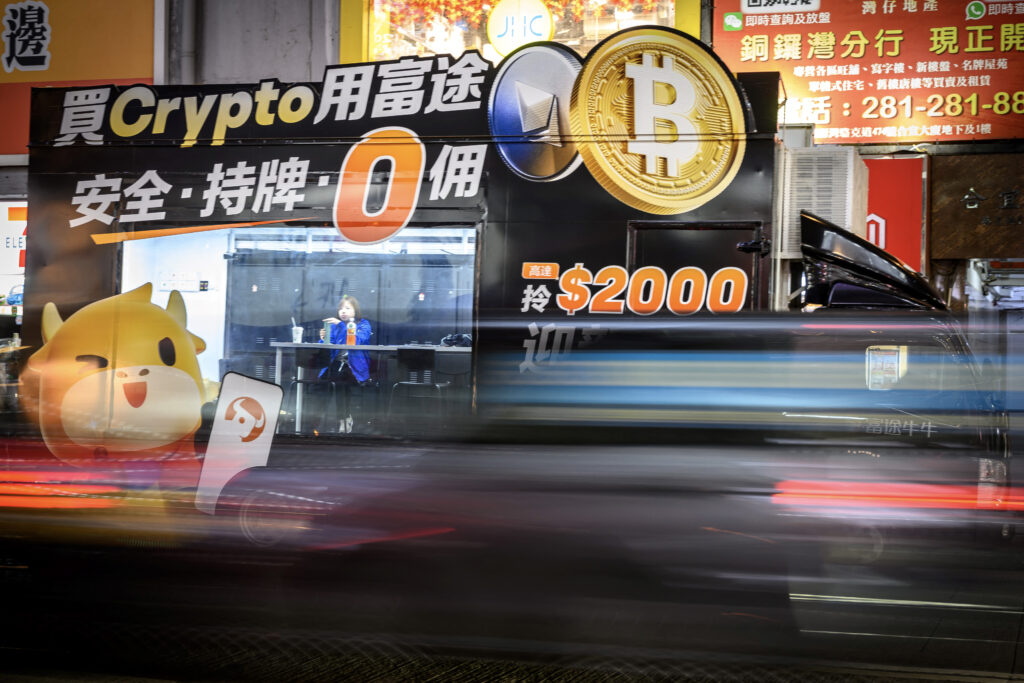
(FILES) An employee sits inside a Bitcoin exchange advertisement truck in Hong Kong on November 27, 2024. | Photo by Mladen ANTONOV / AFP
HONG KONG, China – Bitcoin burst past $100,000 for the first time Thursday as traders welcomed Donald Trump’s pick to head the US Securities Commission, while Seoul stocks slipped as South Korea’s president faced impeachment after his brief imposition of martial law this week.
After hovering around the mid-$90,000 mark in recent weeks, the popular cryptocurrency finally burst through the historic level in Asia after it emerged that Trump had chosen major crypto proponent Paul Atkins to take over as chair of the Securities and Exchange Commission (SEC).
READ MORE:
South Korea stocks drop, won stable as Asian markets fluctuate
October inflation in Cebu rises to 2.8% as typhoon effects, food costs take their toll
Atkins is the founder of risk consultancy firm Patomak Global Partners, whose clients include companies in the banking, trading, and cryptocurrency industries.
It has jumped more than 50 percent since Trump’s poll win—and around 140 percent since the turn of the year—on hopes the US President-elect will push through measures to deregulate cryptocurrencies.
On the election campaign trail, he pledged to make the United States the “bitcoin and cryptocurrency capital of the world”.
The rally in bitcoin came as traders kept track of events in South Korea after President Yoon Suk Yeol’s dramatic declaration of martial law, which was lifted within hours.
The nation’s opposition has now pushed for his impeachment, while the defense minister has resigned over the crisis.
The upheaval comes as Asia’s number-three economy struggles to gain traction while worries build on the possible impact of Trump’s presidency as he prepares to reignite his hardball trade policy when he takes power next month.
Optimism seen
But analysts saw some optimism.
“The silver lining we think is that the swift reversal of the martial law underscores the resilience of South Korea’s institutions,” said analysts at BMI, a unit of Fitch Solutions.
“For now, we expect limited implications for the economy and financial markets as the Bank of Korea and the ministry of finance have responded swiftly by reassuring investors,” they said.
Trinh Nguyen, senior economist for emerging Asia at Natixis CIB, said the turmoil represented “a growth shock rather than a sovereign risk”.
Seoul’s Kospi fell only slightly in afternoon trade, having finished more than one percent down Wednesday.
The won—which initially hit a two-year low when the crisis erupted—remained at around 1,415 per dollar, slightly up from its levels before the martial law declaration late Tuesday.
Investors are also keeping tabs on France after the three-month-old government of Prime Minister Michel Barnier was brought down in a no-confidence vote linked to a controversial budget proposal.
The news out of the eurozone’s number-two economy had been expected, and the euro saw no major impact, but the move injected fresh uncertainty into an already fraught political situation in France after divisive elections earlier this year.
Elsewhere in Asia, it was mixed as investors struggled to track a record for all three main indexes on Wall Street, where soft data on jobs and services boosted hopes for a Federal Reserve interest rate cut this month.
Tokyo, Shanghai, Sydney, Singapore, Mumbai, and Taipei rose, but Hong Kong, Wellington, Jakarta, and Manila slipped.
Key figures around 0430 GMT
Tokyo – Nikkei 225: UP 0.2 percent at 39,360.72
Hong Kong – Hang Seng Index: DOWN 1.0 percent at 19,547.01 (break)
Shanghai – Composite: UP 0.2 percent at 3,370.18 (break)
Seoul – Kospi Index: DOWN 0.5 percent at 2,451.41
Euro/dollar: UP at $1.0522 from $1.0510 on Wednesday
Pound/dollar: UP at $1.2708 from $1.2702
Dollar/yen: DOWN at 150.26 yen from 150.56 yen
Euro/pound: UP at 82.79 from 82.71 pence
West Texas Intermediate: UP 0.1 percent at $68.61 per barrel
Brent North Sea Crude: UP 0.1 percent at $72.38 per barrel
New York – Dow: UP 0.7 percent at 45,014.04 (close)
London – FTSE 100: DOWN 0.3 percent at 8,335.81 (close)